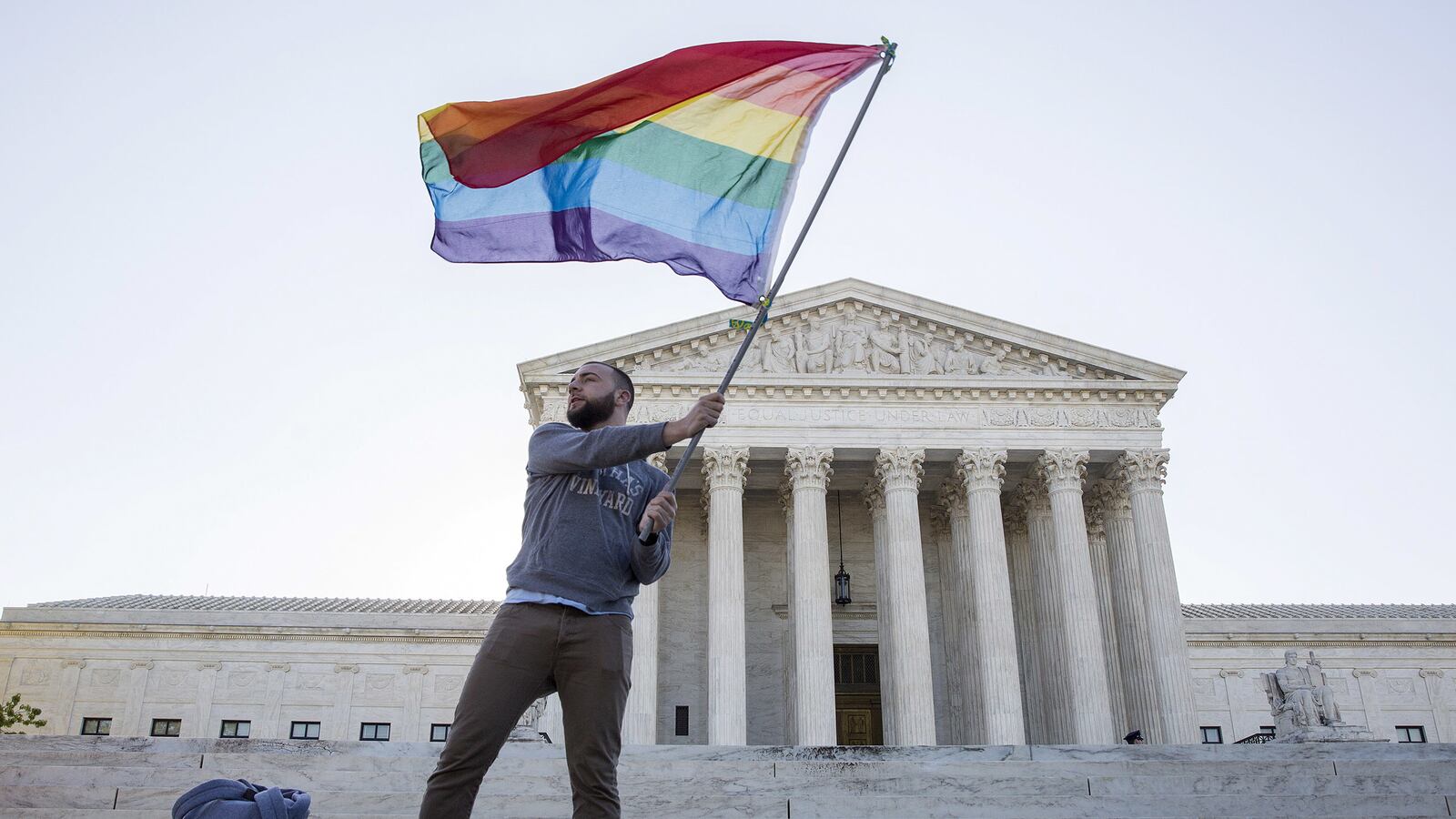Not quite a year after the U.S. Supreme Court ruled on the side of gay couples seeking marriage rights, a major blow to religious conservatives, Christian conservatives in Missouri are poised to take a shot back.
Republicans in the state Senate on Wednesday forced a vote on a measure that would ask voters whether to change the Missouri constitution to ban state officials from penalizing individuals, businesses, or religious entities who refuse to participate in marriage ceremonies for same-sex couples—from wedding singers to cake bakers.
“The court answered one question very definitively: It declared marriage was a fundamental right. The court left many more questions unanswered than answered,” said state Sen. Bob Onder, a conservative Republican who introduced the measure last month.
The Missouri showdown is another episode in a series of recent clashes between gay-rights advocates seeking equality and religious conservatives who view the changes in American culture as contrary to their beliefs. As others have, Onder pointed to pushes by gay students on college campuses for groups to be more inclusive to them, while religious groups have responded with proposals to allow student religious organizations to turn away non-religious members.
“There are a number of different ways where people of faith and religious organizations feel like they might be subject to penalties and outright persecution,” he said. While he said he was not aware of any occurrences of that in the wedding business, he said his measure is intended to be “pre-emptive.”
“I think people of faith in the wedding industry feel very afraid,” he said.
In Jefferson City, Democrats, who occupy only eight seats compared to 24 held by Republicans, at least briefly had a louder collective voice. They stalled for 37 hours, one of the longest continuous debates there in recent history, until Republicans deployed a rarely used procedural tool to cut off debate and force a vote. (The measure needs another vote in the Senate and in the House, where Republicans also hold a strong majority, before it can head to voters this fall.)
“This resolution is a national embarrassment for Missouri,” said Sen. Joseph Keaveny, the Democratic leader.
In 2004, Missouri was the first state in the union to enshrine in its constitution a ban on marriage for gay couples after the Supreme Court ruled in favor of them the year before. Just like it was with them, the state again finds itself on another legal frontier—this time enshrining such a specific religious protection into its constitution.
“It’s more permanent that way, and it gives the people the chance to vote on it,” said Joshua Hawley, a law professor at the University of Missouri and a Republican candidate for attorney general.
Hawley, who clerked for Chief Justice John Roberts before joining the Becket Fund for Religious Liberty, said while Missouri might be early in acting on new constitutional protections specifically for wedding vendors, other states are considering their own similar policies.
“This decision back last June opened up a new possibility of a culture war over marriage and religious liberty,” Hawley said. “If you have sincere religious belief, you should be able to follow it. This is how you prevent a culture war—you accommodate beliefs.”
Even though Democrats did during their drawn-out debate over the bill, Onder said he would not compare his legislation to the more broad “religious freedom restoration” acts other states have considered. Indiana passed one in 2015, but it was not as specific as Missouri’s would be to wedding vendors.
Still, just as businesses and the National Collegiate Athletic Association voiced strong opposition to the Indiana law, some Missouri business groups—many of which have supported anti-discrimination bills in the past—have expressed similar concerns in their state.
“As we saw in the reaction to the signing of the Indiana Religious Freedom Restoration Act last year, laws that allow those engaged in public commerce to discriminate will hurt our economy and our image as a welcoming state,” said Hart Nelson, vice president of the St. Louis Regional Chamber of Commerce.
Since the 2004 vote, much has changed in the Show-Me State, a place with deeply rooted religious convictions. Back then, Attorney General Jay Nixon, a Democrat, opposed equal marriage rights for gay couples. It was not until 2013 when Nixon, now the second-term governor, announced his evolution on the issue. On Wednesday, he voiced his opposition to the latest push by the legislature.
“Rewriting our state’s constitution to condone discrimination would be contrary to our values and harmful to our economy,” he said in a statement.
When Missouri’s constitutional ban passed in 2004, it did so on the August primary ballot. This time, Onder wants it on the November ballot—along with one of the country’s hottest gubernatorial races, Republican Sen. Roy Blunt’s re-election fight, and, of course, the presidential race, whose primary is just arriving in Missouri ahead of the March 15 primary.
Early Wednesday, Texas Sen. Ted Cruz—a Republican who has basked in the glow of evangelical conservatives on the campaign trail—tweeted about his opposition to the Democrat-led filibuster, while both Democratic contenders voiced their support. In a tweet signed “-H,” Hillary Clinton said Tuesday, “Marriage equality is the law. I stand with those filibustering in [Missouri] to make sure discrimination won’t be.”
Eli Yokley, the former editor of PoliticMo.com, is a political reporter in Washington, D.C. He can be reached at EliYokley@Gmail.com and at @EYokley.






